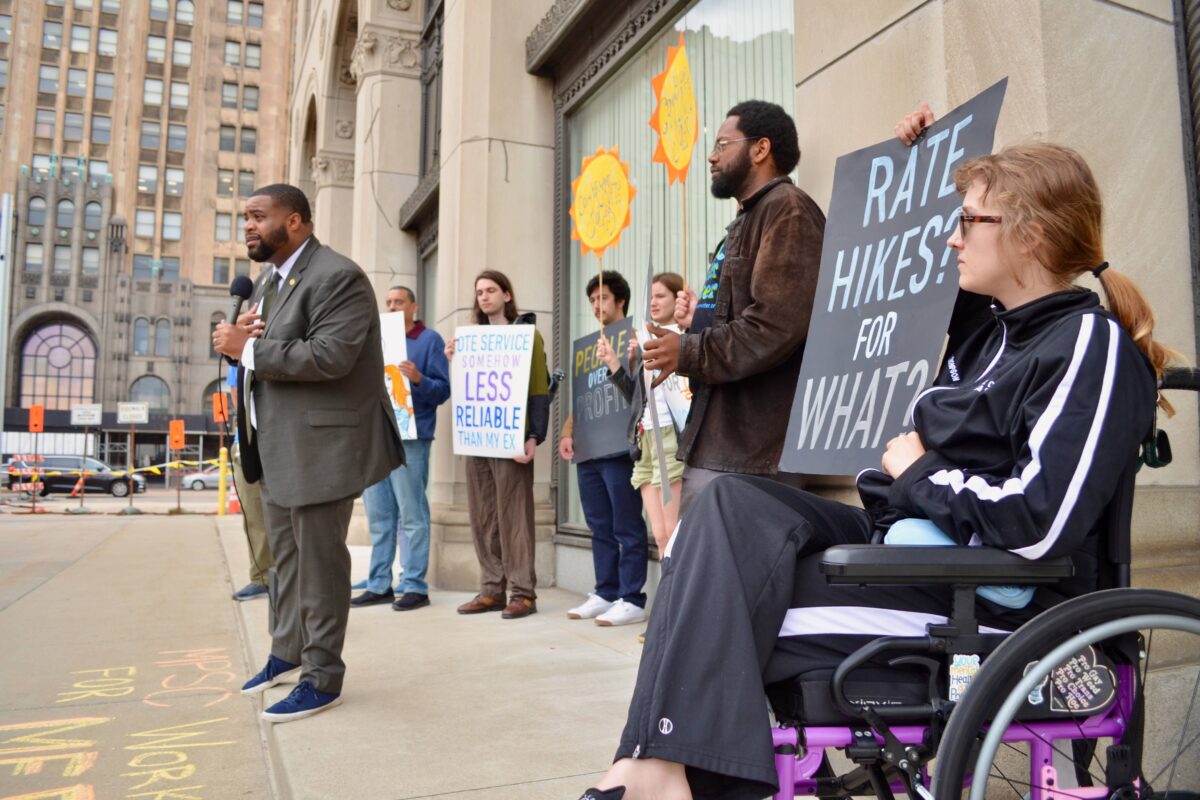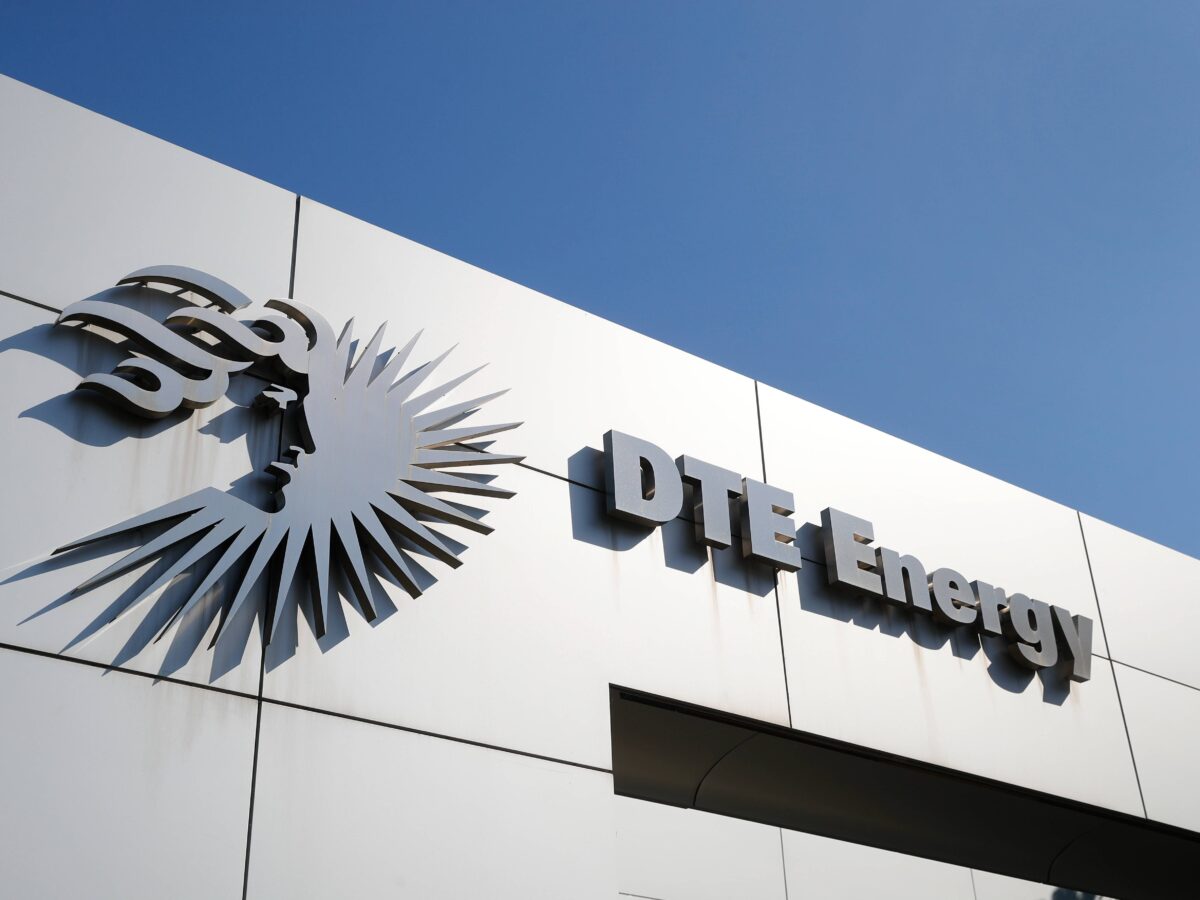Overview:
-State Rep. Donavan McKinney touts legislation to block political donations by utilities and major government contractors.
-McKinney spoke outside a MPSC town hall focused on the commission's public engagement and incorporation of feedback into its decision-making.
-DTE Energy seeks a $574 million rate hike at the same time the Trump administration looks to eliminate funding for the Low Income Home Energy Assistance Program.
High energy bills and frequent power outages are taking a heavy toll on Detroiters who also struggle to pay for child care, rent, and other expenses, according to State Rep. Donavan McKinney.
McKinney, a Detroit Democrat, spoke at a rally in front of Cadillac Place in Detroit’s New Center neighborhood, where the Michigan Public Service Commission held a town hall Thursday to discuss the committee’s public engagement practices.
The state lawmaker recounted his own difficulties dealing with a power outage after the birth of one of his children, forcing his family to spend nearly $2,000 to stay in a hotel room for five days.
“I have over 1,000 constituents without power right now,” McKinney said, explaining that an equipment failure had caused an outage in his district, which includes parts of northeast Detroit and Warren.
“When we’re talking about these rate increases that DTE and Consumers Energy keep asking the MPSC to greenlight … we’re talking about our residents and communities who are literally struggling already, just to survive,” he said.
DTE Energy is seeking a $574 million electricity rate increase at the same time that President Donald Trump’s administration looks to eliminate funding for the Low Income Home Energy Assistance Program, which helps low-income households pay their power bills.
McKinney touted his sponsorship of the “taking back our power legislation” to block utilities and major government contractors from making political donations.
“It is unbelievable how much influence our utilities have over our political system and over our elected officials,” he said. Michigan Energy First, a DTE-linked nonprofit, spent nearly $4.9 million supporting candidates in 2022, Bridge reported.
Detroit mayoral candidate Joel Haashiim also attended the rally, telling Planet Detroit he favors the creation of a municipal utility to lower costs and improve service.
“We’re living check to check. The check is not growing, but the rates and the costs continue to grow,” Haashiim said, adding that Detroiters are squeezed by other costs like high car insurance rates, property taxes, and water bills.
‘A public participation forum on public participation’
The MPSC town hall, which focused on the commission’s process for engaging the public and incorporating feedback into decision making, may not have given residents much opportunity to vent their frustration over high energy bills and power outages. Yet Commissioner Katherine Peretick said it is important for improving how the MPSC operates.
“So yes, this is a public participation forum on public participation. It’s a bit meta, and I understand that,” she said. The MPSC needs to take this step to understand how it could better incorporate ratepayer concerns, Peretick said.
MPSC Chair Dan Scripps told Planet Detroit the meeting could help bring more ratepayers into the process of filing official intervenor testimony, which would be subject to cross-examination and could directly influence how commissioners make decisions on rate hikes and other issues.
“There’s a balance to be struck there, honestly, between sort of allowing for venting of frustration, and providing meaningful ways to actually influence the record that we have in front of us that we can base a decision on,” Scripps said.
Under the system as it stands, comments made by individuals at public hearings or as part of online dockets for regulatory actions can’t be considered in MPSC decisions.
The number of parties officially intervening in cases has grown, and the Michigan Legislature has increased funding to support intervenors through grants from the Utility Consumer Participation Board, Scripps said. The Legislature has also issued a directive to prioritize support for intervenors representing communities dealing with environmental injustice or where households spend large portions of their income on energy.
The commission is looking for ways that individuals can voice their concerns so that formal intervenors can use these comments to inform testimony, Scripps said.
MORE REPORTING FROM PLANET DETROIT
DTE Energy, Consumers Energy shareholder returns drive up Michigan energy bills: ‘It’s costing consumers so much money’
A national study reveals investor-owned utilities are charging U.S. ratepayers up to $50 billion annually for shareholder profits.
DTE files for $574 million rate hike, its second-largest request, months after its last increase
DTE Energy’s $574.1 million rate hike proposal aims to boost infrastructure and clean energy, raising Michigan residents’ bills by $13.50 monthly. Critics, including Michigan Attorney General Dana Nessel, challenge the plan, demanding proof that DTE’s expenses and rates are fair and justified.
Report: DTE profits soar as customers face shutoffs, rising rates and fossil fuel expansion
DTE Energy is disconnecting thousands of customers while increasing rates and expanding fossil fuel infrastructure, despite its profits surging 41% in 2024 and its business model prioritizing profits over affordability and reliability.
Ratepayers seek ways to influence utility oversight
Thursday’s town hall was organized around breakout sessions, with the roughly 60 attendees separated into three groups to meet with commissioners and MPSC officials about Commission outreach efforts and how individuals can influence decision-making.
Amy Bandyk, executive director of the Citizens Utility Board of Michigan, flagged what she said are the disproportionate costs residential utility customers pay compared to industrial energy users.
“It’s documented that residential rates have skyrocketed, and industrial rates have stayed about the same,” she said, asking Scripps where advocates should go to address the issue if not taking it to the Commission.
Scripps said the Commission is responsible for this issue, but that it’s “less litigated” than many other topics in rate cases. He said the Commission welcomes strong input on the issue.
Aaron Kuhn of St. Clair Shores asked how he can find out what groups might be intervening on his behalf and whether he should be submitting comments directly to such groups for potential inclusion in official testimony.
Kuhn suggested the MPSC add a button on its website to connect ratepayers with intervenor groups. Bandyk said Illinois includes information about such groups as inserts in power bills.
Scripps said the MPSC is looking for other ways to connect community groups and others with organizations granted intervenor status in official proceedings.
Following the meeting, Rafael Mojica, program director for the energy democracy nonprofit Soulardarity, said efforts to get more input from ratepayers on how the Commission operates are long overdue, but potentially a step in the right direction.
“At least they are capturing very pointed information and comments and suggestions from ratepayers that don’t just capture the emotional toll of the unaffordability of rates, but actually the perspective of solutions from ratepayers,” he said.





